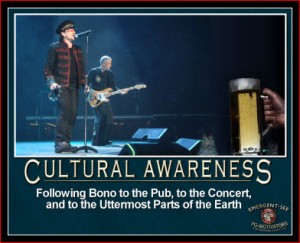“Too many musicians, not enough theologians.”
This might be the epitaph of the Emerging Church ten years from now. This would be unfortunate, but it’s not too late to change the legacy of the Emerging Church. One place to start would be with  church “worship leaders”. I seriously wonder how much theological reflection goes into writing some of our “great worship songs” of the past ten years. We’re in a famine of theologically rich, musically excellent music for the church. Maybe you feel the hunger pains?
church “worship leaders”. I seriously wonder how much theological reflection goes into writing some of our “great worship songs” of the past ten years. We’re in a famine of theologically rich, musically excellent music for the church. Maybe you feel the hunger pains?
But writing theologically correct songs isn’t all that it takes to change this potential legacy. Writing theologically rich worship songs is one thing, leading a church into engagement with that theology during music and through the week is quite another.
Theological Reflection on “Worship” Sets
While I’d like to reflect more on how the Emerging Church already needs reform, I also want to offer constructive solutions. One way to help is to consider “how to reflect on a music set.” What governs set selection? Pragmatics, Music, Liturgy? Here is the theological reflection that went into a recent worship set by one of our music leaders. Be sure to pay attention to the questions she asks, how she wrestles through theme, theology, and music (italicized) to help lead the church.
- “Waiting” is a song that our community knows well… it talks about the futility of serving the world and the choruses are new creation focused.
- Let me know your thoughts on “Community Song” vs. “Come Ye Sinners” …basically does the community angle or the repent angle fit better?
- “Carried To the Table“: Some of the original words implied that we are victims of the fall rather than culprits… so we changed a few words to reflect our doctrine (see attached)… I think that this one will fit well with your message… but let me know if it doesn’t!
- I thought that we could read Ps 34:1-8 here… it will take us from Fall, Redemption — to Praise! “Taste and see that the Lord is Good”
- “Sing Your Praise” this one is a song that we wrote for our community… it is a great praise song (see attached lyrics)
- Then I thought that we could reprise “Waiting” at the end on a New Creation theme. This could change depending on your message… sometimes as I listen to the message I realize that a different song would be better to close with.
Theologically Reflective Music Represented Here
The Human Engine Waits
ONE: Austin City Life Worship
Leeland
 their churches. He lists five simple, intuitive but rarely practices ways to informally make disciples:
their churches. He lists five simple, intuitive but rarely practices ways to informally make disciples:


